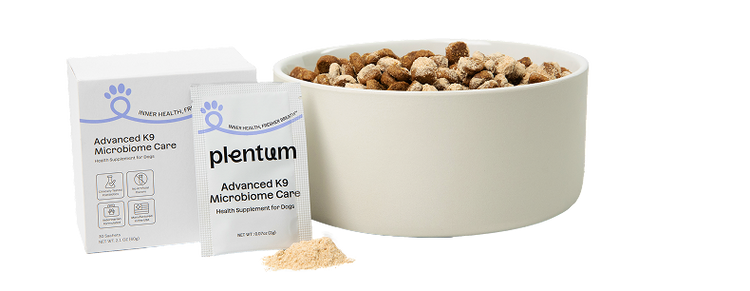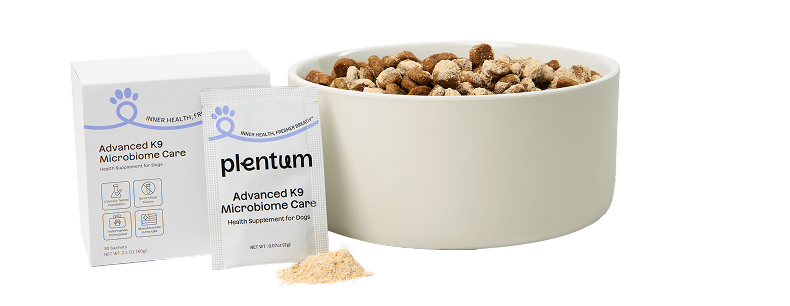Key Takeaways
- Dogs display coprophagia through instinctual behavior and medical conditions and behavioral triggers.
- Your dog needs immediate veterinary evaluation to check for health issues while you must maintain complete control of their environment through immediate waste removal.
- The use of taste-deterrents proves ineffective yet supporting your dog's digestive health through proper supplements might help by enhancing nutrient absorption.
Pet owners experience the most disturbing and confusing behavior when they discover their dog consuming fecal matter. Your dog starts eating feces without warning which forces you to find an immediate solution for this new problem. The behavior known as coprophagia occurs frequently in dogs. The solution process needs less emotional response because it demands more investigative work.
This vet-recommended guide will explain the multiple factors that drive your dog to eat poop and present a detailed plan to help you control this behavior permanently.
What Are the Instinctual Reasons My Dog Eats Poop?
The behavior of eating feces might not be a problem because it stems from natural instincts. Mother dogs naturally consume their puppies' waste to protect their den from predators while maintaining cleanliness. Young puppies develop this behavior through two possible mechanisms: they learn from their mother or they use their mouths to explore their environment.
Research conducted in 2018 established that dogs might have inherited the behavior of eating feces as a survival mechanism from their ancestors. Scientists believe dogs consume fresh feces because it allows them to eliminate parasites before they reach maturity which protects their pack from infections. The behavior persists because dogs retain their ancestral instinct to consume feces.
Could Medical Issues Cause My Dog to Eat Poop?
The first thing you need to determine is whether your dog has any medical issues. A dog who starts eating feces for the first time as an adult needs to visit a veterinarian right away. The behavior indicates possible health issues that need medical evaluation.
Nutrient Malabsorption and Maldigestion
When dogs experience poor nutrient absorption they will attempt to retrieve these nutrients from their stool. The presence of dog poop undigested food becomes visible to owners. The inability of Exocrine Pancreatic Insufficiency (EPI) and Inflammatory Bowel Disease (IBD) to function properly as digestive enzymes results in malnutrition which drives dogs to consume their own stool.
Increased Appetite (Polyphagia)
Diseases that affect the body can create an endless feeling of hunger in dogs. The combination of Diabetes and Cushing's disease and steroid medications leads dogs to develop such intense hunger that they start eating everything including feces.
Dietary Deficiencies & Parasites
Modern commercial dog food provides balanced nutrition to most dogs but occasional nutrient deficiencies might trigger this behavior. The main reason for this behavior stems from internal parasites that live inside dogs.
What Behavioral Triggers Lead to Poop Eating?
When your veterinarian declares your dog healthy then behavioral factors become the primary reason for this behavior.
-
Stress, Anxiety, or Boredom: Dogs who spend extended periods alone without proper exercise or mental stimulation will consume feces because they need something to do.
-
Attention-Seeking: Your dog will learn to eat feces because they receive instant attention from you when they approach poop even though the attention is negative.
-
Learned Behavior (Fear): The practice of harsh house-training methods leads dogs to develop a habit of eating their own feces as a way to hide their accidents.
A Vet-Recommended Action Plan to Stop the Habit
The solution to stop coprophagia needs multiple steps which do not include any quick fixes.
Step 1: Consult Your Veterinarian
Your first essential action should be to consult with your veterinarian. Your veterinarian will perform tests which include fecal parasite detection and blood tests to identify any medical conditions from the list above.
Step 2: Manage the Environment (The #1 Strategy)
The instinctual nature of your dog makes environmental management the most successful treatment approach. The main objective requires complete blocking of access to all areas.
-
Immediate Cleanup: The "Clean Slate" strategy requires you to immediately retrieve stool when your dog defecates outside.
-
Leash Up: The leash serves as a control measure to prevent your dog from reaching for stool during walks even in your home yard.
-
Litter Box Lockdown: The litter box needs to be placed in a location which your dog cannot reach (behind a baby gate or on a high surface) when they show interest in cat feces.
Step 3: Use Training and Enrichment
While you handle environmental control you should teach your dog to perform alternative actions.
-
Teach "Leave It": The "Leave It" command stands as the most essential command for dogs who eat their own feces. Start training with unimportant treats while providing strong rewards for successful completion.
-
Create a New Routine: Your dog should receive a high-value treat immediately after completing their defecation while you call them to you with joy. The process teaches your dog that coming to you brings better rewards than checking their feces.
What About a Supplement to Make My Dog Stop Eating Poop?
Many pet owners seek fast solutions through powders and chews and supplement to make dog stop eating poop which claim to stop dogs from eating their own feces. The 2018 study revealed that taste-aversion products failed to deliver any significant results because their success rate approached zero (1).
The real solution for your dog's health should focus on digestive system support instead of taste modification. A digestive supplement containing postbiotics and digestive enzymes will help your dog absorb nutrients better. The method treats the fundamental causes of the behavior by enhancing digestion which prevents dogs from consuming dog poop undigested food in their stool. A dog with improved gut function serves as the foundation for complete canine wellness.
A Poop-Free Future for You and Your Dog
The discovery of your my dog eat poop creates a new challenging situation for you. The behavior of eating feces in dogs usually indicates an underlying issue which could be an inherited behavior or a medical problem or a learning deficiency.
Your veterinarian along with environmental management and positive training and gut health support will help you control this behavior so you can focus on enjoyable aspects of dog ownership.
Frequently Asked Questions
Q: Will my puppy grow out of eating poop?
Many puppies do! It's often an exploration phase that fades by nine months. However, it's always best to manage it early so it doesn't become a habit.
Q: Why does my dog only eat cat poop?
Cat food is very high in protein, making cat feces particularly "appealing" to a dog's natural scavenging instincts. It's a common and frustrating problem for pet owners.
Q: What should I do right after my dog eats poop?
Calmly lead them away (don't punish them). You can gently wipe their mouth, offer fresh water, and provide a dental chew to help clean their teeth and breath.
Q: Can I use punishment to stop the behavior?
No. Vets and behaviorists agree that punishment increases fear and anxiety, which can actually make the poop-eating behavior worse. Always use positive reinforcement.
Q: Are "dog vitamins for poop eating" effective?
Vitamins might help if a specific deficiency is the cause, but this is rare. Focus on a balanced diet and digestive supplements to support overall gut health.
References
-
Hart, B. L., Hart, L. A., Thigpen, A. P., & Tran, A. (2018). The paradox of canine conspecific coprophagy. Veterinary Medicine and Science, 4(2), 106–114. https://www.ncbi.nlm.nih.gov/pmc/articles/PMC5980124/
-
VCA Animal Hospitals. (n.d.). Dog Behavior Problems - Coprophagia. Retrieved October 27, 2025, from https://vcahospitals.com/know-your-pet/dog-behavior-problems-coprophagia









